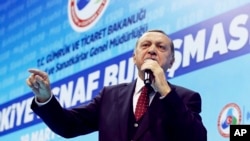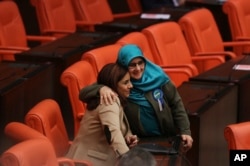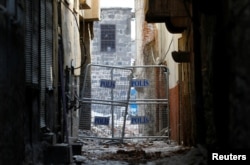Turkish security forces carried out mass arrests of pro-Kurdish activists in the run-up to Tuesday's Nowruz celebrations, which mark the start of the Kurdish new year.
Nearly 1,000 activists have been arrested in a week-long nationwide sweep by Turkish security forces.
Authorities say the detentions are aimed at preventing possible attacks by the PKK Kurdish insurgent group, which has been fighting the Turkish state for greater minority rights. Turkey considers the PKK a terrorist organization.
Critics argue the crackdown has little to do with fighting terrorism. "All of those who have been arrested are local HDP activists," said Ertugrul Kurkcu, parliamentary deputy of the pro-Kurdish party.
"The government wants to keep the Kurdish masses out of squares and streets and out of the political context," he argued. "It's obvious the Nowruz celebration is an opportunity for a political awakening and the horizon of Nowruz this year is the referendum."
Turkey will hold a referendum next month on giving President Recep Tayyip Erdogan sweeping powers, and the HDP is in the forefront of campaigning against that vote.
Security concerns have also been cited for banning Nowruz celebrations in Turkey's capital, Ankara, and Istanbul, which is home to the world's largest Kurdish population. Permission has been granted for celebrations in Diyarbakir, the main city in Turkey's predominantly Kurdish southeast.
Nowruz is widely acknowledged as the most important event of the year for Kurdish cultural identity. For decades, it was banned in Turkey.
U.S.-based Human Rights Watch, in a report released Monday, highlighted what it described as an alarming crackdown on pro-Kurdish groups in Turkey.
"It's deeply damaging to Turkey's democracy that the government is locking up the leaders and MPs of an opposition party that received five million votes in the last election," said Hugh Williamson, Europe and Central Asia director at Human Rights Watch. "The fact that the curbs come during a vital national debate about the country's future is doubly disturbing."
"We have not seen anything on this scale for many, many years," said Emma Sinclair Webb, chief Turkey researcher for Human Rights Watch. She said the timing and scale of the arrests, which includes 13 HDP members of parliament, are of concern.
"In the run-up to the referendum, there is a huge crackdown on Kurds in Turkey and a crackdown on the second opposition party in Turkey's parliament, which has a lot of its members in prison, including the leaders of the party," said Webb.
Moreover, Webb said on the local government level, "you have got 82 municipalities basically brought under government control and co-mayors of those municipalities jailed. They've seen 5,000 of their party officials jailed as well. There is no coincidence in the timing of this crackdown; it's entirely intended to frustrate the activities of a big parliamentary opposition party."
The government refutes such allegations, arguing it is engaged only in fighting terrorism. Interior Minister Suleyman Soylu has promised no let up in the crackdown, despite concerns over the forthcoming referendum.
"The arrests and detentions are upsetting our regular [campaign] work creating a shortage of experienced and seasoned organizers and activists," said parliamentary deputy Kurkcu.
Kurkcu said the "No" campaign is adapting, going in an "unsusal direction."
"The campaign is not run by organizing [traditional] outdoor rallies," he said, "but through door-to-door campaigning and this campaigning is conducted by everyone available. This doesn't require political leadership, but political courage and political will."
Most opinion polls predict the outcome of the referendum remains too close to call. Analysts point out the crackdown on pro-Kurdish groups also plays well with Turkish nationalist voters — key constituents in Erdogan's bid to win the referendum — making any let-up in the wave of detentions unlikely.
"They really cannot step back from what they have done, what they've engaged in, because we do have a referendum and they cannot make any maneuver that would look like they are capitulating,"said Soli Ozel, an international relations expert at Istanbul's Kadir Has University.






